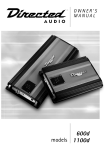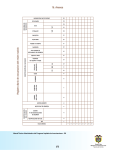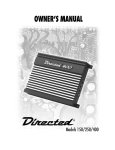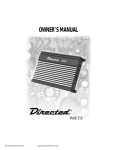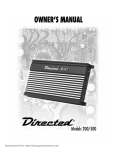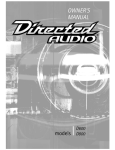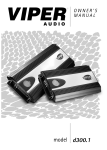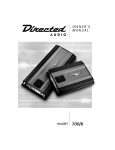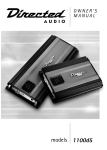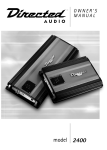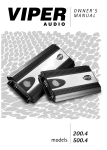Download DEI 600d Owner`s manual
Transcript
OWNER’S MANUAL Models 600d/1100d CONGRATULATIONS Thank you for choosing a Directed Audio power amplifier. Directed has been the leader in high-quality and innovative security products in the U.S. since 1990. Now we introduce to the car audio industry the same winning formula - products that meet the stringent standards of today’s mobile electronics enthusiast yet priced for anyone’s budget. Featuring high-efficiency MOSFET power supplies, flexible on-board crossovers, and state-of-the-art audio design, Directed Audio amplifiers will satisfy every music lover’s needs for years to come. Your Directed Audio power amplifier comes with a two year limited warranty if it is installed by an authorized DEI dealer. Amplifiers not installed by an authorized Directed dealer are covered by a one year partsand-labor limited warranty. Please save your sales receipt and refer to the warranty section of this manual for complete details. © 1999 Directed Electronics, Inc TABLE OF CONTENTS Installation Guidelines . . . . . . . . . . . . . . . . . . . . . . . . . . . .Page 2 Amplifier Connections . . . . . . . . . . . . . . . . . . . . . . . . . . . .Page 4 Amplifier Controls . . . . . . . . . . . . . . . . . . . . . . . . . . . . . . .Page 5 Speaker Wiring Diagrams . . . . . . . . . . . . . . . . . . . . . . . . .Page 6 Crossover Setting and Gain Adjustment . . . . . . . . . . . . . . . .Page 7 Synced Gain Operation . . . . . . . . . . . . . . . . . . . . . . . . . . .Page 8 External Synced Bridged Operation . . . . . . . . . . . . . . . . . . .Page 10 Specifications . . . . . . . . . . . . . . . . . . . . . . . . . . . . . . . . .Page 12 Warranty . . . . . . . . . . . . . . . . . . . . . . . . . . . . . . . . . . . . .Page 13 WARNING High-powered car audio systems may produce sound pressure levels that exceed the threshold at which hearing loss may result. © 1999 Directed Electronics, Inc They may also impair a driver’s ability to hear traffic sounds or emergency vehicles. Use common sense and practice safe listening habits when listening to or adjusting your audio system. 1 INSTALLATION GUIDELINES 1. Please read the owner’s manual carefully before you install the amplifier. 2. Disconnect the battery ground terminal prior to making any electrical connections. 3. Check for any hazards or obstructions such as gas tanks, fuel or brake lines, and wiring harnesses before mounting the amplifiers. 4. Pick a mounting location that will provide adequate access and ventilation and protect the amplifier from heat, moisture, and dirt. 5. Avoid sharp metal areas when routing cables to the amplifier, and run RCA cables away from the power cables and other potentially noisy car harnesses. 6. The amplifier should be grounded with a short, heavy gauge wire connected directly to the car at a bare metal surface. Make sure that the metal area is part of the car chassis or frame, not a separate part with poor electrical connection to the chassis. 7. Always fuse your power connection at the battery within 8-10 inches of the battery terminal. Use a fuse or circuit breaker rated at about 5-10 2 more amps than the on board fuse(s) of the amplifier(s). The gauge of power wire used should take into account the total current draw of the system, and the length of wire used. IASCA and other autosound competition organizations have charts available for this; you can also find a chart in the MECP study guide. Minimum wire gauge recommendations for the individual amplifiers are listed on the specification page. It is a good idea to use the same gauge wire for the amplifier ground that you use for the power wire. Be sure to examine the battery ground cable of the vehicle and upgrade it to a gauge of wire that can accommodate the extra load created by your amplifier installation. Remember, the amplifier can only deliver its rated output when it is not current limited by the power and ground supply wires. 8. This amplifier is designed to drive a speaker load that measures from 14 ohms. Keep in mind that heat is the long-term enemy of automotive electronics and that the lower your speaker load, the more heat © 1999 Directed Electronics, Inc INSTALLATION GUIDELINES (continued) is generated. For low impedance speaker applications or restricted ventilation installations, an external cooling fan may be advisable. 9. Your connections to the amplifier’s speaker and power terminals should be made with crimped spade lugs, and the battery and ground connections to the vehicle should be made with crimped ring terminals of the appropriate size (surface area is what counts); soldering the terminals after crimping is also recommended. © 1999 Directed Electronics, Inc 10. Due to the high-frequency MOSFET switching power supply used in all Directed Audio amplifiers, filtering the power cable is not generally required (remember that the amp can’t deliver full output if the power supply is restricted). Proper grounding of the signal source is mandatory for the amplifier to reach its performance peak. If the RCA inputs are not grounded adequately via the signal source, electrical noise from the vehicle may be picked up in the system. 3 AMPLIFIER CONNECTIONS Refer to Figure 1 for details. 1. GROUND TERMINAL - connect this terminal to the car chassis with a short heavy gauge wire, DO NOT CONNECT TO THE NEGATIVE TERMINAL OF THE CAR BATTERY or to factory chassis ground points already occupied by factory wires! Make sure your chassis connection is secure by removing any paint at the ground point, and using a crimped, soldered terminal at both ends of the wire. 2. REMOTE TERMINAL - connect this terminal to the amplifier remote output from your head unit or signal source, if it provides one. You may also use the power antenna output wire from decks that do not have separate amp remote outputs. Do not connect this terminal to a constant source of +12V. 3. +12V POWER TERMINAL - connect this terminal to the positive terminal of the car or separate audio system battery. YOU MUST PROTECT THIS WIRE WITH A FUSE or circuit breaker located close to the battery. 4. POWER FUSE - protects the amplifier against electrical damage. DO NOT REPLACE THE FUSE WITH LARGER AMPERAGE FUSES! 5. POWER/PROTECTION LED’S - the green Power LED lights to indicate normal operation. The red Protection LED lights to indicate amp shutdown due to thermal, short circuit, DC offset, or over-current conditions. 6. SUBWOOFER OUTPUT TERMINALS connect the subwoofers to these terminals. The terminals are paralleled internally, but two sets are provided for convenience in connecting multiple subwoofers. FIGURE 1—AMPLIFIER CONNECTIONS 4 © 1999 Directed Electronics, Inc AMPLIFIER CONTROLS Refer to Figure 2 for details. 1. RCA INPUT JACKS - accepts linelevel outputs from head units or signal sources at voltages from 200 mV to 8 volts. 2. RCA INVERT IN JACK - use this jack to accept signal from another 600d/1100d when operating in synced slave mode. This jack also supplies an in-phase output when the unit is set to “Master”. 3. RCA INVERT OUT JACK - use this jack to send an inverted phase signal to another 600d/1100d operating in synced slave mode. 4. MASTER/SLAVE INVERT SWITCH selects operating mode for synced operation. For normal operation set to master/0. 5. GAIN ADJUSTMENT - controls the gain (input sensitivity) of the amplifier. 6. SUBSONIC FILTER - Switchable variable subsonic filter prevents damage to subwoofers in vented and free-air applications. 7. BASS EQ - This switch activates an 8 dB bass boost circuit. Use as necessary for low frequency enhancement. 8. CROSSOVER FREQUENCY - controls the cutoff frequency of the built-in low-pass crossover. 9. OUTPUT PHASE INVERT SWITCH controls the output phase of the amplifier. The output signal inverts with the switch set to 180. 10. REMOTE SUB LEVEL - controls gains of the amplifier. FIGURE 2—AMPLIFIER CONTROLS © 1999 Directed Electronics, Inc 5 SPEAKER WIRING DIAGRAMS Single subwoofer connection Speaker nominal impedance must be at least 1 ohm. Two subwoofer connection Parallel speaker nominal impedance must be at least 1 ohm. Amplifier parallels the speaker terminals internally. 6 © 1999 Directed Electronics, Inc CROSSOVER SETTINGS AND GAIN ADJUSTMENT Your Directed Audio power amplifier needs to be adjusted carefully to achieve maximum performance. These are some guidelines to follow when fine-tuning the amplifier. Refer to the additional instructions on pages - for gain and crossover settings in external synced mode. • Because the 600d/1100d are only suited for subwoofer applications, the low-pass crossover is active at all times. The crossover point is adjustable to allow more precise system operation. • Try and keep the setting low enough to prevent image smearing (you should not be able to hear male voices from the subwoofer) but not so low as to create a gap between the subwoofer and the mid-bass/midrange speakers. It will be to your advantage to spend some extra time with this adjustment, listening to familiar music or system set-up discs to achieve the kind of musical reproduction that you prefer. • The gain adjustment allows you to set proper signal match for clean, quiet amplifier operation. Start by playing some music you are familiar with. With the gain adjustment on the amplifier in the middle of its rotation, bring up the volume on your head unit to the 3/4 volume setting or until you start to hear distortion or clipping. If you hear distortion before you reach the 3/4 volume setting of your head unit, reduce the gain setting on the amplifier and start to raise the head unit volume again. When you can listen to the music at or slightly above 3/4 on your head unit without audible distortion, slowly raise the gain of the amplifier until distortion is heard, then back off the gain until the distortion is not audible. This setting will allow you to reach full output with all but the quietest of source material, while avoiding excessive noise in the system. • You should take into consideration the effect that gain adjustment has on system frequency response and staging. Again, plan on spending some time with music that you know getting the gain and crossover settings the way you like. Test discs and analyzers may help with this process, but in the end it's your ears that count - listen to the music! © 1999 Directed Electronics, Inc 7 SYNCED GAIN OPERATION (control panel/inputs) Refer to Figure 3 for details. 1. Master/Slave switch - set switch on the first amp to Master/0 for most systems. Set switch to Master/180 to invert the phase of both the master and any synced amplifiers. Set the Master/Slave switch on all synced amplifiers to Slave. 2. Connect input signal from the head unit or processor to the input RCA jacks of the master amplifier. 3. Connect an RCA cable between the INVERT IN RCA jack of the master amplifier and the INVERT IN jack of slaved amplifiers. Use “Y” adapters to split the signal to each slaved amplifier. 4. For best matching of input gains, connect the unused INVERT OUT RCA jack of the master amplifier to the INVERT OUT RCA jack of the slaved amplifiers. The slaved amplifier ignores the signal supplied to the INVERT OUT jack, but the additional RCA cable connection helps minimize ground potential differences between the master and slave amplifier inputs and results in a more accurate output voltage match . 5. Set subsonic, EQ, and crossover controls to the positions for best results. FIGURE 3 8 © 1999 Directed Electronics, Inc SYNCED GAIN OPERATION (wiring diagram) Refer to Figures 3 and 4 for details. 6. Remote sub level - connect a single remote sub level control to each amplifier using a telephone cable splitter as shown in Figure 3. 7. The master amplifier’s gain control (Figure 3) is used to set the overall sub amp gain. The gain controls of the slaved amplifiers are not functional and the overall gain is set by the master amps gain and then by the remote sub level control. 8. Connect the outputs of each amplifier to their separate subwoofer load. In synced gain operation each amplifier can drive a 1, 2, or 4 ohm load. 9. Remember that the amplifier parallels any speaker load connected to the two pairs of supplied terminals. You may safely connect one 2 ohm subwoofer or 2 ohm combined load to each of the two pairs of terminals or one 1 ohm subwoofer or 1 ohm combined subwoofer load to a single pair of (+/-) terminals. Do not connect combined loads of less than 1 ohm to the amplifier. FIGURE 4 © 1999 Directed Electronics, Inc 9 EXTERNAL SYNCED BRIDGED OPERATION(control panel/inputs) Refer to Figure 5 for details. 1. Master/Slave switch - set switch on the first amp to Master/0 for most systems. Set switch to Master/180 to invert the phase of both the master and any synced amplifiers. Set the Master/Slave switch on all synced amplifiers to Slave. 2. Connect input signal from the head unit or processor to the input RCA jacks of the master amplifier. 3. Connect an RCA cable between the INVERT OUT RCA jack of the master amplifier and the INVERT IN jack of slaved amplifiers. 4. For best matching of input gains, connect the unused INVERT IN RCA jack of the master amplifier to the INVERT OUT RCA jack of the slaved amplifiers. The slaved amplifier ignores the signal supplied to the INVERT OUT jack, but the additional RCA cable connection helps minimize ground potential differences between the master and slave amplifier inputs and results in a more accurate output voltage match. 5. The Bass EQ, subsonic switches and frequency controls, and crossover frequency conrols should be matched on the both amps for best results. FIGURE 5 10 © 1999 Directed Electronics, Inc EXTERNAL SYNCED BRIDGED OPERATION (wiring diagram) Refer to Figures 5 and 6 for details. 6. Remote sub level - connect a single remote sub level control to each amplifier using a telephone cable splitter as shown in Figure 5. 7. The master amplifier’s gain control (Figure 5) is used to set the overall sub amp gain. The gain control of the slaved amplifier is not functional and the overall gain is set by the master amp’s gain and then by the remote sub level control. 8. Connect the outputs of each amplifier to their separate subwoofer load. In external synced bridged operation each pair of amplifiers can safely drive a 2 or 4 ohm load. 9. NOTE - you must connect the negative subwoofer outputs of the master amplifier to the negative subwoofer outputs of the slaved amplifier as shown in Figure 6. Use 12 AWG speaker wire minimum to make this connection. Otherwise the output of the two synced amplifiers will be unstable and they will not supply rated power. FIGURE 6 © 1999 Directed Electronics, Inc 11 SPECIFICATIONS 600D/1100D model RMS continuous power driven into 4 ohms from 20 to 250 Hz @ 14.4 VDC THD at rated power/load 275 watts 0.4% 425 watts 0.5% RMS continuous power driven into 2 ohms from 20 to 250 Hz @ 14.4 VDC THD at rated power/load 400 watts 0.6% 750 watts 0.75% RMS continuous power driven into 1 ohm from 20 to 250 Hz @ 14.4 VDC THD at rated power/load 600 watts 0.8% 1100 watts 0.9% Dynamic power rating (IHF-202 Standard) at minimum load RMS continuous power driven into 4 ohms from 20 to 250 Hz @ 14.4 VDC in synced bridge mode (two 600d) 750 watts 800 watts 1400 watts 1500 watts RMS continuous power driven into 2 ohms from 20 to 250 Hz @ 14.4 VDC in synced bridge mode (two 1100d) 1200 watts 2200 watts Signal-to-Noise Ratio Greater than 85 dB Frequency Response 20-250 Hz +0, -1 dB Damping Factor 50 (typical) Crossover Low-pass 18 dB/octave, variable from 30 to 250 Hz Subsonic Filter Switchable 18 dB/octave, variable from 20 to 250 Hz Bass Equalization Input Impedance Input Sensitivity Output Impedance Supply Voltage Fusing and Power Cable Requirements (AWG) (Per amp, trunk mounted) 12 600d 1100d +8 dB, centered at 40Hz 20K ohms Variable from 150 mV to 8 volt 1 to 4 ohms 10 to 16 VDC 60A 80A #8 #4 © 1999 Directed Electronics, Inc LIMITED TWO YEAR CONSUMER WARRANTY Directed Electronics, Inc. (DEI ) promises to the original purchaser, to replace this product should it prove to be defective in workmanship or material under normal use, for a period of two years from the date of purchase by the dealer as indicated by the date code marking of the product PROVIDED the product was installed by an authorized DEI dealer. During this two year period, there will be no charge for this replacement PROVIDED the unit is returned to DEI, shipping pre-paid. If the unit is installed by anyone other than an authorized DEI dealer, the warranty period will be 1 year from date of purchase by the dealer as indicated by the date code marking of the product. During this 1 year period, there will be no charge for this replacement PROVIDED the unit is returned to DEI, shipping pre-paid. This warranty is non-transferable and does not apply to any unit that has been modified or used in a manner contrary to its intended purpose, and does not cover damage to the unit caused by installation or removal of the unit. This warranty is void if the product has been damaged by accident or unreasonable use, neglect, improper service or other causes not arising out of defects in materials or construction. ALL WARRANTIES INCLUDING BUT NOT LIMITED TO EXPRESS WARRANTY, IMPLIED WARRANTY, WARRANTY OF MERCHANTABILITY, FITNESS FOR PARTIC® © 1999 Directed Electronics, Inc ULAR PURPOSE, AND WARRANTY OF NON-INFRINGEMENT OF INTELLECTUAL PROPERTY ARE EXPRESSLY EXCLUDED TO THE MAXIMUM EXTENT ALLOWED BY LAW, AND DEI NEITHER ASSUMES NOR AUTHORIZES ANY PERSON TO ASSUME FOR IT ANY LIABILITY IN CONNECTION WITH THE SALE OF THE PRODUCT. DEI HAS ABSOLUTELY NO LIABILITY FOR ANY AND ALL ACTS OF THIRD PARTIES INCLUDING ITS AUTHORIZED DEALERS OR INSTALLERS. Unit must be returned to DEI, postage pre-paid, with: consumer’s name, telephone number, and address, authorized dealer’s name and address, and product description. IN ORDER FOR THIS WARRANTY TO BE VALID, YOUR UNIT MUST BE SHIPPED WITH PROOF OF INSTALLATION BY AN AUTHORIZED DEI DEALER. ALL UNITS RECEIVED BY DEI FOR WARRANTY REPAIR WITHOUT PROOF OF DEI DEALER INSTALLATION WILL BE COVERED BY THE LIMITED 1 YEAR PARTS AND LABOR WARRANTY. Note: This warranty does not cover labor costs for the removal and reinstallation of the unit. BY PURCHASING THIS PRODUCT, THE CONSUMER AGREES AND CONSENTS THAT ALL DISPUTES BETWEEN THE CONSUMER AND DEI SHALL BE RESOLVED IN ACCORDANCE WITH CALIFORNIA LAWS IN SANDIEGO COUNTY, CALIFORNIA. 13 OTHER PRODUCTS AVAILABLE FROM: ® • • • • CLASS D MONO AMPLIFIERS 2 CHANNEL AMPLIFIERS 4 AND 5 CHANNEL AMPLIFIERS SIGNAL PROCESSORS • • • • TUBE SUBWOOFERS POWERED SUBWOOFERS SINGLE AND DUAL VOICE COIL SUBWOOFERS COAXIAL SPEAKERS • • • SINGLE AND DUAL VOICE COIL SUBWOOFERS COAXIAL SPEAKERS COMPONENT SPEAKER SYSTEMS • • SINGLE AND DUAL VOICE COIL DIE-CAST SUBWOOFERS COMPONENT NEODYMIUM SPEAKER SYSTEMS • SINGLE AND DUAL VOICE COIL DIE-CAST SUBWOOFERS • • • • • HIGH PERFORMANCE POWER CABLES PREMIUM SPEAKER/AUDIO CABLES AND ADAPTERS POWER CAPACITORS GOLD-PLATED POWER DISTRIBUTION AND FUSING BLOCKS GOLD-PLATED POWER AND SPEAKER TERMINALS Always use a © 1999 Directed Electronics, Inc • Vista, CA 92083 • All Rights Reserved DEI is a proud member of G45014 9/99
















